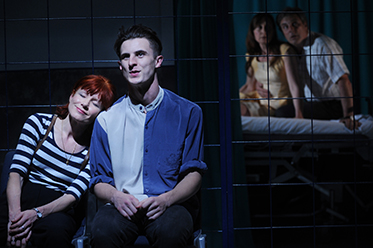 From the Jurassic to our own Anthropocene epoch, environmental pressures push all life towards adapting to survive. Sometimes that means getting better at blending in. Migrants to Australia, starting from that first non-anglo wave of the 1950s, know something of this.
From the Jurassic to our own Anthropocene epoch, environmental pressures push all life towards adapting to survive. Sometimes that means getting better at blending in. Migrants to Australia, starting from that first non-anglo wave of the 1950s, know something of this.
Its effect on parents and the locally-born generations that follow, lies at the core of Jurassica by Dan Giovannoni with dramaturg Gary Abrahams. Many moments of this world-premiere production are memorable, either through pushing emotional buttons or earning the laughter of recognition.
Raffaello, nowadays known as Ralph (Joe Petruzzi), migrated from Italy to Australia many years ago as a young man, eventually setting up a family home in Moorabbin. He doesn’t see his adult son Ichlis (Jordan Fraser-Trumble) or seventeen year-old grandson Luka (Edward Orton) very much.
Ralph is admitted to hospital while Ichlis is working in Perth, leaving only Luka able to attend the bedside. Ralph is confused, and Luka was never encouraged to learn Italian, so a multilingual Serbian translator Kaja (Olga Makeeva) is called to help the grandson talk to his Nonno.
We periodically depart from the hospital and Ralph’s uncertain state, to see events set in motion as a result, and flashbacks giving us aspects of the family history. These introduce the late Sara (Caroline Lee) who followed Ralph from their village to marry him, and Luka’s Australian mother Penny (Devon Lang Wilton), long estranged from Ichlis.
There’s a remarkable feeling of authenticity to many of these scenes. Some capture how immigrants adapt to local conditions, such as where the family seamlessly slip from their native tongue to English and back again. Then there are depictions of conflict between the old and the new. Wilton and Lee conspire to give a humorous portrayal of anglo awkwardness, as caused by Penny negotiating the expectations of tradition and family cultivated by a welcoming yet gently persistent matriarch.
As the narrative jumps back and forth, we get to see more of how relationships used to be, and hints of how they evolved into what they are now. Characters show more depth as a result; Orton shows his Luka to be more than a sullen teenager through his time talking with the abrasive and direct Kaja. Her portrayal by Makeeva adds colour and levity when the hospital scenes could otherwise become heavy going. Yet the story of this fiercely independent woman who speaks five languages is the least defined, making her more of a device than a character.
In a similar way, I wanted to know more about Ichlis. We do come to have some idea of why he adopt Australian tendencies. However, I felt there could have been more exploration of what drives some children to largely opt-out of their parents’ culture. Still, Fraser-Trumble has good scenes with Petruzzi in particular, where the actions of youth are doubly loaded as rebellion against a history as well as a father. In flashbacks Petruzzi gives Ralph a cheeky charm, quiet dignity, and the particular warmth that often only children can receive from a Papa or Nonno.
That the production is consistently very watchable and engaging surely speaks to the time spent developing the script and the talents of director Bridget Balodis. From the director’s note in the programme, her family’s migration history might have helped her guide characters towards having features that are recognisable without being stereotypical. I liked the idea of having Sara wear her hair down to indicate her youth, and wondered if similar devices could be used to help the audience quickly lock-on to other eras of the story. That said, technical matters such as changing from present day to recollections are handled smoothly so as not to disrupt the flow of the piece.
Part of the life of ‘new Australians’ interpreted by Jurassica is the mythology of home. Ralph has one such story, which we visit through his descendants. Although I appreciated the work overall, the injection of fantasy left me feeling somewhat mixed. This seemed to be an imposition of writerly cleverness upon the play that I found not so convincingly bonded to the whole. As a result, I did wonder if the piece is trying to excavate a little too much ground. Maybe this is the sort of work that would benefit from a Q&A session with the playwright?
What Jurassica undoubtedly does well is provide a view of the Australian migrant experience, and it’s not just a version of The Shifting Heart with a nonlinear narrative. It prompts us to an understanding that a history spurned becomes like a dinosaur skeleton; a curious relic of the past that comes to mean much less than it did when it was alive. Showing us that we have a window in which to choose whether extinction does or doesn’t occur ultimately makes the play a hopeful work.
There’s more than enough to enjoy in Jurassica to encourage the curious to get along and make up their own mind. Given the universality of its themes to modern Australia, I’m sure it will find points of resonance with many, regardless of their origins.
Jurassica
Red Stitch Actors Theatre, Rear 2 Chapel Street, St Kilda East
Performance: Saturday 17 October 2015 – 3.00pm
Season continues to 7 November 2015
Bookings: (03) 9533 8083 or online at: www.redstitch.net
For more information, visit: www.redstitch.net for details.
Image: Olga Makeeva and Edward Orton in Jurassica – photo by Jodie Huntchinson
Review: Jason Whyte
